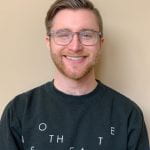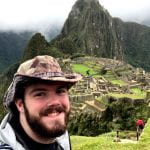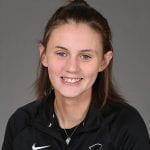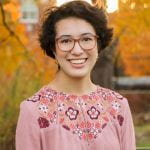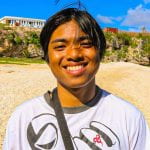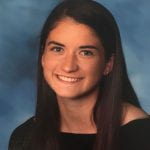Undergraduate Research Awards
Summer 2023 Veritas Undergraduate Research Awards

Hidden Voices: The Repression of Female Sexual Difference Under the Castroist Dictatorship and its Implications for Modern Cuban Society
Sarah Downey ’24, Spanish/Secondary Education
Faculty Mentor: Dr. Monica Simal, World Languages and Cultures
Within a patriarchal society, the woman is defined strictly in the realm of the man. Social institutions see the woman not as an autonomous being, but as a subordinate entity meant to satisfy male desires and conserve the traditional family structure. However, the repression of women is not uniform. Lesbian-identifying Cuban women experience a distinct intersection of gender, sexuality, and race that contributes to an array of challenges. During the Fidel Castro’s dictatorship (1959-2008), an epoch in which the political ideologies and laws in Cuba established a fervent opposition to homosexuality, to be ‘cubana’ and ‘lesbiana’ was irreconcilable. Over the course of my literary investigation, I will study the lesbian struggle for existence under the Castroist regime and the long-term effects of Castroist ideologies on modern-day Cuban society. The lesbian voice is one of the many voices that the dictatorship has silenced. I aim to bring visibility to this voice.
Aerobic Scope and Muscle Physiology
Mireille Kingsley ’24, Biology/Secondary Education
Faculty Mentor: Dr. James Waters, Biology
In this project, I will recruit student athlete participants who are training over the summer to measure the effects of increasing muscle composition and performance on their resting energy expenditure, aerobic scope, and time to fatigue. Data will be conducted over the course of 4 weeks, while student athletes follow a strength training program. Using the Apollo system I will be able to measure both resting metabolic rate and active metabolic rate. This data will allow us to see the changes in aerobic scope due to strength training over the course of 4 weeks. This research connects physiology, exercise science, the health science, and help shatter myths and educate student athletes about how our bodies really work.
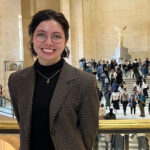
“The Whore Queen of Incestuous Canopus”: The Eroticization of Cleopatra VII’s Feminine and Ethnic Identity in Roman Literature and Art
Carley Medeiros ’24, History and Classics
Faculty Mentor: Dr. Robin Greene, History and Classics
The rulership of Cleopatra VII Thea Philopater is known in the modern conscious primarily through William Shakespeare’s “Antony and Cleopatra” along with popular Hollywood depictions of the glamorous, seductive Egyptian pharaoh. Ancient sources depicted Cleopatra similarly, criticizing her supposed seductress reputation, her foreignness, and, most especially, her womanhood. The foreign Egyptian queen threatened the power structure of Rome via her close relationships with Caesar and Mark Antony. Rome thus sought to condemn her public image and through art, poetry, and literature, vilified the young queen. Statues began to depict her as a vile seductress, literature described her as polluting and diseased, poetry denoted her deviancy and foreignness. Through an eroticization of Cleopatra Philopater VII’s political image, Roman elites effectively condemned Cleopatra’s ethnic identity and womanhood, expressing the perversity of such a rule; a gynaikokratia. This project seeks to understand how Cleopatra envisioned herself, analyzing ancient sources from a new perspective.

Stereotypes of Mathematics and Mathematicians in Media: A Review of Literature
Sarah O’Connor ’26, Mathematics
Faculty Mentor: Dr. Kevin O’Connor, Secondary Education and Dr. Olga Limnios, English
Published research on mathematics and mathematician stereotypes in media have been shared in the literature. However, a synthesis of this body of work does not exist. It is the purpose of this project to fill this gap and provide those interested in this area of research with a comprehensive review of its literature.

Examining the Theoretical Underpinnings of International Relations via a Case Study: the Globalization of Ideas within the 2022 Iranian Uprising
Catherine Raacke ’25, Political Science and Women’s and Gender Studies
Faculty Mentor: Dr. Sara Hassani, Political Science and Women’s and Gender Studies
Dominant international theory frameworks fail to account for the modern-day globalization of ideas. Frameworks such as Liberalism and Realism account for how countries interact internationally but do not account for how citizens within these countries interact with each other and subsequently influence their country’s political actors and institutions. This project will examine dominant theoretical frameworks—including Liberalism, Realism, & Marxism— in international relations alongside the more recent interventions made by constructivists and feminist scholars to analyze each framework’s strengths and weaknesses. It will examine their strengths and weaknesses by studying the current Iranian uprising, which began in September 2022, wherein globalization and the travel of ideas from Kurdish women’s struggles in Turkey and Syria have been central to shaping the predominant discourse of the “Woman, Life, Freedom” movement. The goal is to identify and assess which of these frameworks best accounts for globalization’s causal and constitutive effects and why.
Summer 2023 Undergraduate Research Awards

Gut Microbiome Research
Sean Coyne ’26, Biochemistry
Faculty Mentor: Dr. Tyler Stack, Chemistry and Biochemistry
The general goal of our lab is to research specific enzymes from bacteria in the gut microbiome to understand how they change the chemical structure of drugs. My proposed research specifically is looking at the enzymes that could modify corticosteroids. I will focus on two enzymes, specifically the “desmolase” which removes carbon atoms from cortisol and similar drugs, and then a dehydrogenase enzyme that can oxidize/reduce these molecules by characterizing the enzymes and the resulting molecules they produce.

Impact of FTD on Behavior of Drosophila models
Megan DePoy ’24, Biology
Faculty Mentor: Dr. Marla Tipping, Biology
Frontotemporal Dementia (FTD) is the second most common form of early onset dementia. FTD is characterized by atrophy of the frontal and temporal areas on the brain. This project aims to asses the behavior in Drosophila melanogaster, fruit flies, that model the disease, as compared to those that do not. General activity levels of the two groups will form a baseline for behavior in FTD drosophila that can then be used in testing treatments for FTD. Smell-learning assays will also be conducted in order to understand the impact of FTD on the drosophila’s learning ability over time compared to the control group.
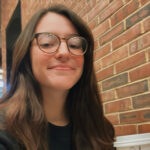
Mother Ocean: A Philosophy of Eros through Water
Ava Dobski ’25, Philosophy
Faculty Mentor: Dr. Jeffery Nicholas, Philosophy
Serious reflection on the relationship between science and spirituality has been around for at least 3,000 years. However, there still remains an important gap in traditional thinking about science and faith, especially in regards to the power of water. The goal of my research is to produce an academic essay that philosophically investigates the relationship between humans and water, primarily focusing on the concepts of water birth and Eros. Water birth has scientifically shown to increase the capacity for love in both mother and child. Eros is an unremitting sexual longing linked to the longing for immortality. The highest form of Eros is the Eros that opens one up to the promise of philosophy itself; to understand being. In its completion, my research will show that the reconnection between water and birth can create a fulfillment of Eros, one which can lead humans to reach their utmost potential for growth.

An Aristotelian Feminist Critique of The Real Housewives Franchise
Elizabeth Gates ’24, Philosophy
Faculty Mentor: Dr. Jeffery Nicholas, Philosophy
In this research, I seek to connect elements of Aristotle’s practical philosophy regarding human flourishing to popular modern media. I will focus specifically on The Real Housewives Franchise and the intersection of race, gender, and class portrayed on television. In this discussion, I will explore Aristotle’s pleonexia and vices pertaining to profit. This lens will inform a detailed feminist critique of Bravo’s portrayal of women as “real.” The Real Housewives Franchise has garnered a broad academic audience and I will consult these sources in my extended research. As a whole, the study aims to deconstruct the production of media and its place in culture. In doing so, it will be clear whether these programs are productive and empowering, or exploitative.

Consignment Store Market Research
Mary Gifford ’26, Social Science
Mentor: Kelly Ramirez, Ryan Incubator for Entrepreneurship in the Arts & Sciences
This research will expand upon the idea of a consignment store for Providence College students. The store will allow people to bring in their lightly worn clothes for an incentive as well as provide a place where students can buy items at affordable prices. Throughout the summer, I plan to conduct market and operational research to successfully launch a business that will serve both Providence College and the local community. The project will focus on understanding how a thrift shop model can work on a university campus, conducting web-based research on similar college-based models, conducting phone interviews with leadership teams running these ventures, and conducting community-based interviews to identify the needs of Providence locals. The expected impact of my research will be a greater understanding of the market and the ability to take the next steps confidently with experience and connections in the field.
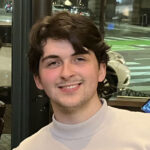
Nos Populi: Classical Influences on Madisonian Thought & Modern Applications
Raymond Jarvis ’24, Political Science and Classics
Faculty Mentor: Dr. Patrick Breen, History and Classics
This project will be directed at analyzing the influence the ancient Greek and Romans had on James Madison’s contribution to the ratification of the United States Constitution, utilizing the Federalist Papers in conjunction with supplementary sources to understand Madison’s perspective, before turning toward attempting to adapt Madison’s solutions—for the mortal disease of faction—into a modern setting.

Principles in Practice: Father John LaFarge’s role in Shaping the Catholic Church’s Interracial Attitude in America and Beyond
John Perry ’24, Theology and History
Faculty Mentor: Dr. Patrick Breen, History and Classics
This thesis studies Father John LaFarge. LaFarge was the largest Catholic voice against racism in the early 1900s. A lot of his story has been documented, however, little attention has been given to what caused him to become such a big advocate for interracialism. LaFarge was able to connect principles and practice during a time when most Catholics did not. He challenged the Church and his nation to live up to the moral standard that they claimed to. This thesis examines the motivation needed for social action especially when it is against the grain. Lafarge believed that racism came primarily not from hate, but from apathy. In that spirit, this thesis is also a call against apathy at every level from a simple worker to a powerful institution.
Shear Heating and Double Ridges on Jupiter’s Moon Europa
Jeffrey Phan ’24, Engineering and Physics
Faculty Mentor: Dr. Noah Hammond, Engineering and Physics
This research investigates the double ridge formation on Europa which is an icy moon of Jupiter. A double ridg has two peaks and a trough and can be thousands of kilometers long and over a hundred meters tall. Through the use of mathematical numerical methods and a coding language named MATLAB, simulations will be created to determine how these ridges form. Shear heating is the theory that tectonic movement on Europa slips and slides much like it does on Earth, and this pushes the land upwards and can potentially form a double ridge. These double ridges are interesting because as the land is pushed upwards, the plate movement creates heat which may melt the surface ice and cause water to form. Water is the basis of life and if this shear heating model proves to be valid, it allows for more research on potential lifeforms on Europa.

American “Inferiority,” the Irish Connection, and the Radical Roots of the American Revolution
David Salzillo ’24, American Studies and History
Faculty Mentor: Dr. Edward Andrews, History and Classics
This research will trace the origins of the American Revolution to, above all else, Americans’ fears of being treated like the Irish in Ireland. By that, I mean that Americans (like Ben Franklin) worried that England’s notion of Americans as backward cultural inferiors would lead to English subjugation or “enslavement” of America. Then, I will argue that, given England’s exploitation of Ireland and its roots in anti-Irish prejudice, the Americans’ fears of a conspiracy to deprive them of their liberty were not necessarily so unreasonable. From there, I will tie Ireland’s development of a notion of “peoplehood” (i.e., separate from the English people) in the 18th century to America’s philosophy of self-determination in government (as seen in Common Sense, for example). I will conclude by exploring the radical implications of this view of the American Revolution.

Art as a Form of Therapy: Afghan Women and their “War Rugs” Highlight the Trauma and Violence of the Soviet-Afghan War
Abigail Turano ’24, History
Faculty Mentor: Dr. Margaret Manchester, History and Classics
Woven rugs have been a traditional element of Afghan culture since nomadic women began carpet weaving thousands of years ago. From the outset of the Soviet-Afghan War, women started to incorporate symbols from this armed conflict—such as tanks, airplanes, and weapons—into their woven carpets, which became known as war rugs. Wartime themes of violence and death are represented in these rugs, as Afghan women used art to channel their resistance and share their traumatic experiences. This conflict had a devastating impact on Afghans, especially women and children. It is thus important to draw attention to the stories of women who fled the violence of the Soviet-Afghan War as well as those who created art to reflect on their wartime experiences. The gender-specific nature of the Afghan war rugs demonstrates the various ways in which women’s experience of war is unique.
Summer 2022 Veritas Undergraduate Research Awards

Transitive Inference in Rats
Shelby Bawden ’23, Biology, Psychology, Certificate of Neuroscience
Faculty Mentor: Dr. Victoria Temple, Psychology
Transitive inference (TI) can be used to create ordered representations of people and things. Rodents have shown to be capable of creating these mental lists through relational processes of TI, which require higher cognition to perform than associative learning processes (AL). In this study, it is hypothesized that if two groups of rats are presented with two five-item lists of odors, then the rats would be able to link both lists into one ten-item list as an ordered representation using relational processes. After showing if they use relational processes through the administration of probe trials. Probe trials would be administered after reaching criterion on both lists. Finally, to further understand the extent to which rats can use relational processes, list-linking pairs would be administered, such as BI, DG, and EF to assess if the rats created an ordered representation of the ten stimuli.
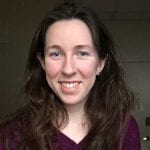
Who Makes Them Blind?: A Novel in Ten Weeks
Fiona Clarke ’23, English and Art History
Faculty Mentor: Dr. Suzanne Fournier, English
This project is the draft of a novel tentatively entitled Who Makes Them Blind?, a title drawn from Exodus 4:11: “The Lord said to [Moses], ‘Who gives [human beings] their sight or makes them blind? Is it not I, the Lord?’” This line suggests two things: First, blindness and vision are common metaphors for perceptions of reality, and it is these characters’ “blind spots” that cause catastrophes for themselves and others. The line also hints that any person’s character is formed by another, that other ultimately being God. These characters are unable to fully explain themselves; instead, they must look outward to others (ultimately, God). This is a story of a woman who attempts to shut out all others, a woman who forgives too easily, a man digging his own grave in the midst of a murder trial, and a would-be psychoanalyst unable to read her own mind.
Providence’s highway system: urban development or dislocation?
Alec Fraggos ’23, History, Political Science minor
Faculty Mentor: Dr. Steven Carl Smith, History and Classics
This project investigates the urban development of Providence, Rhode Island and the impact the construction of I-195 and the 6/10 Connector highways had on the communities in the surrounding areas. Furthermore, the project analyzes the major points of influence that drove the city to construct these highways while simultaneously dislocating and isolating predominately communities of color. Similarly, this project also accounts for the resistance efforts in those communities that were forced to relocate as a result of the I-195 highway construction and the extent to which the city was receptive to the community’s concerns. Lastly, this looks at the connections between urban development and highway construction in twentieth century Providence and how the city viewed highways as mechanisms of this development.

A Scepter of Terror or A Sword of Freedom: Elaine Brown’s time in the Black Panther Party
Maeve Plassche ’23, History/Secondary Education, Political Science minor
Faculty Mentor: Dr. Alyssa Lopez, History and Classics
Elaine Brown joined the Black Panther Party in 1968 and by 1974 she became the first and only woman to lead the Party. This project is going to analyze Elaine Brown’s time within the Black Panther Party and what her leadership meant for the Party and its female members. When Elaine Brown was leader she turned the Party’s attention to electoral politics and community service yet much of this work has gone unnoticed in the remembrance of the Black Panther Party. Elaine Brown’s time within the Black Party Panther helped to galvanize other Black women within the Party and as leader she allowed for these women to have a voice which was used to combat racial and gender oppression.
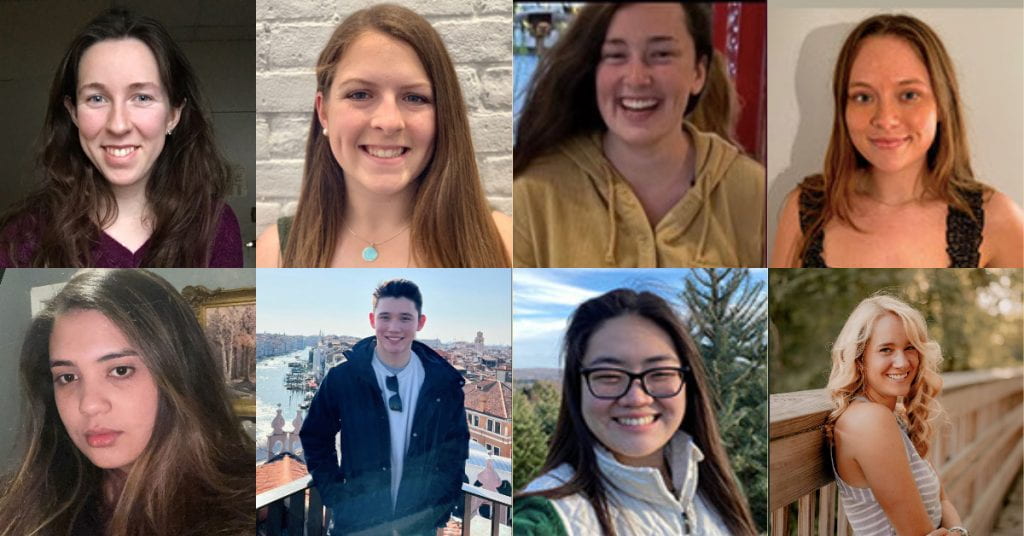
Summer 2022 Undergraduate Research Awards
Implicit Statistical Learning in Morphological Structure and Sub-lexical MO-LS Mappings
Natalia Alzate ’24, Biology and Psychology
Faculty Mentor: Dr. Johanna Morris, Psychology
The purpose of this study is to understand the different brain processes that occur in disorders like dyslexia. To determine potential differences between proficient and below will look at the ability to pick up on the internal structure of words. By distinguishing such differences, we aim to understand the process of word recognition and therefore design effective ways of aiding children in the process of learning to read. We plan to test the hypothesis that readers differ in their sensitivity to the internal structure of words and that these differences are both correlated with the participant’s ability to read. We plan to do this by measuring the (a) quality of readers’ lexical representations, (b) their sensitivity to the internal structure of words. We will correlate these behavioral measures with electrophysiological brain activity to identify neural signatures and determine if similar neural mechanisms are used in complex word recognition.

The Dignity of Desire: Recovering the Place of Eros in Christian Theology
Ana Botelho ’23, Theology and Philosophy
Faculty Mentor: Dr. Michael Wahl, Theology
The goal of this research is to expand upon the work started by Pope Benedict XVI by crafting a more extensive response to the Nietzschean charge that Christianity poisoned eros. This project will examine different definitions of eros throughout history in order to recover and distill an authentic conception of eros that, on the one hand, avoids subordinating it to agape, and on the other hand avoids separating it from or reducing it to sexual desire. This new conception of eros can then be used to refute the claim that Christianity poisoned eros.
Providence Rhode Island: A Reflection of Inequality in the American Education System
Emily Cavanagh ’23, History
Faculty Mentor: Dr. Steven Carl Smith, History and Classics
This project combines scholarly research on education inequality and the urban history of Providence Rhode Island. The City of Providence and the Providence School System will be used as a case study to represent education inequality across the country. The goal of this project is to show education inequality from a nuanced point of view. In the past, research on education has fallen into two categories: Civil Rights and modern issues such as standardized testing. This project will combine both of these categories of research by drawing a connection between the Civil Rights issues such as segregated schools to modern issues of the achievement gap and standardized testing. This project will use local archives in Providence along with one archive in Boston.
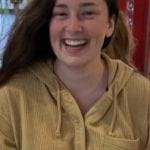
Female Power and Influence across the Mediterranean during the Early Roman Empire
Jacqueline Elia ’23, History and Classics
Faculty Mentor: Dr. Melissa Huber, History and Classics
This project will examine instances of significant female influence and power within the public sphere of various cities across the Mediterranean during the early Roman Empire. My study intends to identify the truth behind a layer of Imperial Roman society and fill in the intentional historical gap created by Roman men who feared female independence in the public domain. This project will rediscover the narratives of societally influential women in the vast Roman Empire left out of the written historical record by analyzing their architectural contributions to their local societies and the subsequent power they earned for themselves through their benefaction.

Art of Community
Nayely Furcal Marte ’23, Business Economics and Global Studies
Faculty Mentors: Dr. Nicholas Longo, Global Studies, Dr. Tuba Agartan, Health Policy and Management, and Professor Eric Sung, Art and Art History
I took an interdisciplinary Community Lens course: Art and Global Studies, which focused on telling stories through the camera lens. Reflecting on things involving our community was transformational for how I saw the city of Providence, where I grew up. It allowed me to use my eyes and art in new ways to find a larger vision. During the semester, I became part of an ongoing action research project with my faculty members, Professors Eric Sung, Dr. Nicholas Longo and Dr. Tuba Agartan, in the Arts of Community project. Which recently received an NEA grant to study the impact of Covid-19 and how the arts can be a vehicle for renewal. This research project will enable me to contribute to the Arts of Community through an original research project (the creation of a case study) and supporting an arts exhibition that will take place at WaterFire in September, 2022.
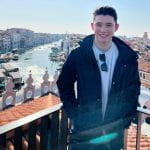
Flag Priming Effects on Shooter Bias
Patrick Kelly ’23, Psychology and Business Management
Faculty Mentor: Dr. Saaid Mendoza, Psychology
The purpose of this project is to build our knowledge on how racial bias can operate through priming of national symbols. Specifically, I hope to examine how identity salient flags (i.e., American flag and Blue Lives Matter flag) can work to influence prejudiced behavior towards Black individuals. This prospective research will use subliminal imagery to examine a potential increase in discriminatory behaviors, as measured by performance of a lexical decision task and a shooter bias task. Given that Blue Lives Matter was initiated in direct response to the Black Lives Matter movement, I hypothesize that priming individuals with this symbol will result in more subsequent bias being shown against Black individuals on a Shooter Bias task. The American flag will be used as comparison to examine how nationalism also may affect race-based decisions. This project could help demonstrate how symbols may contribute towards expressions of racially charged behaviors.
Brazilian Immigrant Youth, Belonging, and the Role of Education on Martha’s Vineyard
Kayla Luyo ’22, Sociology and Women and Gender Studies, Black Studies minor
Faculty Mentor: Dr. Kara Cebulko, Sociology
This research will be a continuation of my independent study, which is an extension of professor Kara Cebulko’s research on globalization and immigration on Martha’s Vineyard. I am currently researching the role of education systems and its impacts on Brazilian immigrant youths’ sense of belonging on Martha’s Vineyard. This semester I have interviewed two high school teachers from Martha’s Vineyard Regional High School from the English Language Learners department. This summer, I will conduct ethnographic research on the Vineyard, visiting these educational spaces and the communities on the island where Brazilians live. I will also use these pre-established contacts with teachers as entry points for conversations/ formal interviews with other educational staff. Additionally, I will meet with Brazilian immigrant-identifying graduates of MVRHS to better understand how their experiences at these institutions affect their experience post-graduation. These conversations will take place at their homes, workplaces, and favorite spots on the island.

The Predation Resistance of Squashed E. coli
Kathryn Mulvey ’23, Biology
Faculty Mentor: Dr. Laura Williams, Biology
The goal of this project is to identify the mechanisms underlying changes in bacterial susceptibility to killing by the predatory bacterium Bdellovibrio. The Williams lab has observed that E. coli adopts a unique “squashed” colony morphology in the presence of the predatory bacteria strain NC01, and preliminary data indicates that the squashed E. coli is resistant to predation. I plan to explore this phenomenon through “wet lab” experimental approaches, such as predation efficiency assays, and computational biology approaches, including a thorough analysis of this bacteria’s genome and gene expression to identify the genes and conditions that prompt this defensive response. This research will not only contribute to new data concerning prey resistance to the literature, but also, will provide valuable information regarding bacterial resistance to predation, which is vital for developing new strategies to combat drug-resistant bacterial infections.
Mapping the Thermal Environment and Modeling Its Impacts on Metabolic Physiology
Lily Palumbo ’23, Biology and Psychology
Faculty Mentor: Dr. James Waters, Biology
We want focus our research on seeing if having a more accurate, localized temperature and humidity sensor allows us to arrive at more useful predictions for insect metabolic rates than using the temperature and humidity available from existing networks of weather stations, supplying the information commonly reported through sources like the news and weather apps on our cellular devices. We want to create custom circuit boards with students from East Providence High School, while also teaching them about environmental aspects, as an outreach program. With these circuit boards, we want to be able to gauge location-specific temperature and humidity in a certain area, rather than relying on the reported values we are given. Simultaneously, we will be developing and deploying these sensors on campus at Providence College to help better understand the ecology of a new invasive species of ants on campus, the needle ant Brachyponera chinesis.
2021-22 Undergraduate Research Awards
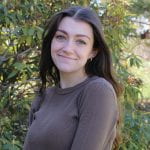

A patient-derived iPSC model to study glutamate deficiency by SHANK-3 Mutation in Autism Spectrum Disorder
Tiffany Berry ’22, Biology and Psychology
Courtney Caccia, ’22, Biology and Psychology
Faculty Mentor: Dr. Charles Toth, Biology
The use of human stem cell lines derived from persons with Autism Spectrum Disorder (ASD) provides a unique opportunity to model brain growth and potential to regain brain activity for treatment. Our lab has previously used stem cells to derive 3D cardiomyocytes to examine cardiovascular disease as well as kidney organoids and macrophages to study kidney disease. Using techniques our lab has learned using these stem cell models have prepared us to examine cell communication in mutated neurons. We will be examining glutamate levels of neurons in those affected by the SHANK-3 mutation. A lowered level of glutamate in cells is present in people with ASD due to a SHANK-3 deletion. We propose using stem cell lines derived from patients diagnosed with ASD who have the SHANK-3 deletion to derive neurons and astrocytes examine the effects of glutamate deficiency on cell communication.
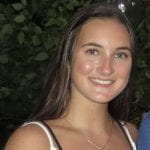
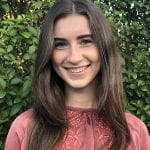
Transcription Factor HLH-11 as a Regulator of the Lipase ATGL-1
Megan Kutey ’22, Biology
Grace Kelley ’22, Biology
Faculty Mentor: Dr. Melissa Silvestrini, Biology
We have previously determined autophagy gene activity is required for normal lipid storage in C. elegans, but the understanding as to why remains uncertain. Our most recent observations have ruled out the cAMP-dependent PKA pathway as being responsible for this increased activity, and our attention has now turned to transcription factor HLH-11. As a known regulator of ATGL-1, overexpression of HLH-11 may be responsible for the mediation of ATGL-1 stability when autophagy is inhibited. We will measure the transcriptional activity in both wild-type animals and atg-7(bp411) loss-of-function mutants. Moreover, we will perform epistasis analysis to determine any potential genetic interactions between atg-7 and hlh-11. These experiments will provide further insight as to why the typically catabolic process of autophagy is required for the storage of lipids.
The Identity Project
Jalynn Booker ’22, Environmental Biology
Faculty Mentor: Dr. Rachel Bonoan, Biology
I am conducting a series of interviews with both PC students and others to learn about the intersectionality and social identity theory in real time. I am looking to investigate what identity is to them, how they identify themselves, how they see identity in society, how society identifies them, and the impacts of this. There will be a documentary portion of this project, which will be showcased along with photos, featuring the interviews used for research. I am then going to interpret my findings and create a visual experience of people’s responses through a performative series of portraits with components of surrealism created in photoshop. This will be on exhibit in the Center @ Moore Hall in March, 2022.

Discussion of Hope in Children
Kelly Drogan ’22, Psychology
Faculty Mentor: Dr. Jennifer Van Reet, Psychology
This project evaluates the relationships between hope and emotional regulation and hope and social support in children. The targeted age demographic will be eight to twelve year olds. The children will complete a series of surveys during the procedure. The first survey will evaluate their perception of hope for their future. The second survey will analyze how that child usually copes with stressful situations. The last survey will determine how much perceived social support the child is receiving in their life.

The Analysis of Mycobacteriophage “Rita”
Anna Fakhri ’24, Biochemistry
Dr. Kathleen A. Cornely, Chemistry and Biochemistry
Discovering new bacteriophages in order to further understand their genomic diversity serves as the primary objective of the SEA PHAGES project. The mycobacteriophage “Rita” was discovered during a five-week research period in a soil enrichment culture that was plated and plaque-picked. This semester the basis of the research project refers to the further analysis of Rita through the annotation of its genome sequence. Annotation will be completed using bioinformatics software such as DNA Master, Phamerator, and PECAAN. In annotating a bacteriophage genome, its genetic diversity can be determined through comparison to other phages of the same cluster. Phage genetic diversity is extensive and understanding its characteristics can aid in determining each individual phage’s ability to be utilized in phage therapy. Ultimately the continuation of researching Rita will provide insight on the phage’s unique genomic characteristics.

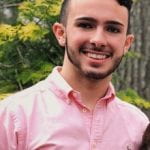
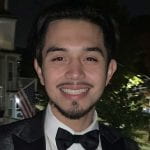
The localization of TMBI-4 in C. elegans
Kevin Ly ’22, Biology and Psychology
Zachary Mederios ’22, Biology and Health Policy and Management
Edy Pineda ’22, Biology
Faculty Mentor: Dr. Melissa Silvestrini, Biology
The goal of our research is to understand the cellular and genetic pathways that underlie aging. We use C. elegans as an ideal model to study the genetics of aging due to its short life cycle, transparent body, and easy maintenance in the lab. Various disorders that are linked to tmbi-4 mutations include the metabolic syndrome of aging, autophagy, and neurodegenerative disorders. Currently, there is no published data on the localization of TMBI-4 in C. elegans tissue. Using fluorescence microscopy, we will determine where TMBI-4 is found in the cell. This will provide more insight into the function of TBMI-4 in C. elegans. Our research may be useful to develop gene-targeting therapies that can be translated towards mammalian organisms, ideally to improve the quality of life of the aging population.
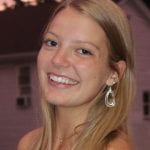
Effect of Pretense on Children’s Risk-Taking Behavior
Sophie Riddick ’22, Psychology
Faculty Mentor: Dr. Jennifer Van Reet, Psychology
I will be designing and running a study which will allow me to investigate whether pretending differentially affects children’s risk-taking behavior based on the character traits of the pretend identity. To do this, I have adapted a task from previous research to assess risk-taking behavior. I will have children complete this task either as themselves, while pretending to be someone safe, or while pretending to be someone not safe.


Differentiation and Maturation of Cerebral Organoids from APOE3/APOE4 Stem Cell Lines
Christopher Walsh ’23, Biology and Psychology
Hayden Lens ’23, Biology
Morgan Kruzan ’23, Biology
Isabella Glennon ’25, Biochemistry (pictured right)
Courtney Caccia, ’22, Biology and Psychology (pictured left)
Faculty Mentor: Dr. Charles Toth, Biology
This research aims to develop 3-D human stem cell models that can be used to study Alzheimer’s Disease. The project focuses on growing cerebral organoids, which share similar properties to normal brain development and function. We will be expanding upon the research from several labs from the past five years to help understand the mechanism of this complex disease. 3-D models are an important way to study neurological disorders because they can be used to examine possible drugs to treat the causes of many neurological diseases. These organoids will be generated using induced pluripotent stem cell lines (iPSCs) which will examine a gene considered a high-risk factor for the development of sporadic AD.
Summer 2021 Veritas Undergraduate Research Awards
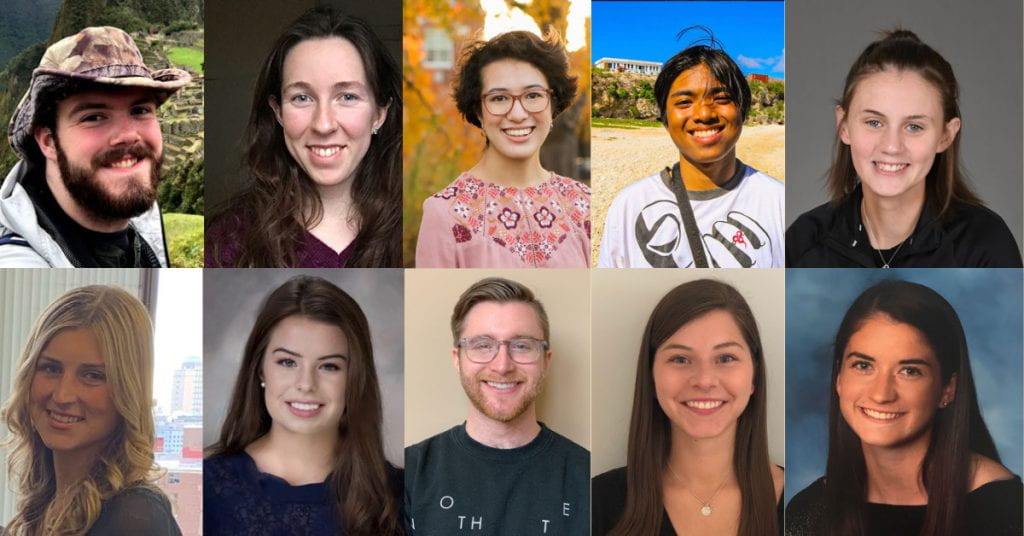
Circadian Phase Shifts Effect of Social Jetlag on cellular metabolism and circadian genes in Wildtype Flies
Olivia Kozub ’23, Biology
Faculty Mentor: Dr. Pamela Snodgrass-Belt, Biology
Drosophila, like humans, have circadian clocks which regulate behavioral and physiological systems within the body. This “biological clock” is synchronized to the environment via temperature and/or light cycles. Small fluctuations in day-length trigger a reset of circadian clocks daily. However, large disruptions can cause health and stress issues such as social jetlag. Social jetlag occurs when an individual’s biological clock clashes with the timing of one’s sleep schedule determined by social factors and the demands of the day.
An Unread Colonial Diary
Brigid McEvoy ’23, History and Spanish major with Business and Innovation and Latin American Studies minor
Faculty Mentor: Dr. Adrian Weimer, History and Classics
I will decipher the shorthand of the second half of Michael Wigglesworth’s diary. Wigglesworth was the most popular poet of Early New England. Despite scholarship on many of his famous poems, there is still much to be uncovered given that no one has yet deciphered the second half of his diary.
Navigating the Challenges Faced by Undocumented Immigrants Seeking Women’s Healthcare Services in the Providence Area
Grace Purvis ’22, Biology and Global Studies
Faculty Mentor: Dr. Tuba Agartan, Health Policy and Management
This project focuses on immigrant women’s access to women’s healthcare needs and on a narrower basis: undocumented immigrant women. My main goal is to better understand how undocumented immigrant women navigate women’s healthcare services in the Providence area.
Summer 2021 Undergraduate Research Awards
Human Capital, Economic Growth, and the Appearance of Conditional Convergence
Brayden Binder ’22, Business Economics
Faculty Mentor: Dr. Fang Dong, Economics
Past research into the idea of “human capital” have examined the metric from one perspective. Either the researchers use the quality measurement of human capital, or the quantity measurement of human capital. Now, with the advent of the new version of human capital, being the combined quality and quantity metric, studies have shown that human capital can still be used to explain technological progress. Due to this, future research must either use both metrics or the combined metric in their models to provide the most up to date results in human capital literature. As such, the goal of this research is to further examine the effects of human capital on economic growth, namely GDP growth. The regression equation used will employ both metrics of human capital separately, along with a “catch up term.” Thus, through regression analysis, the research will be examining the role education plays in creating GDP growth.
Modern Anomalous Demographic (M.A.D): Diary of a Black Woman
Ekua Boakye-Mensah ’22, Political Science and Global Studies
Faculty Mentor: Dr. Zophia Edwards, Sociology
The goal of this project is to understand the complex effects that higher education has on first generation Black women, and the ways it alters and shapes their college experience overall. As a campus voice for women of color, this intersectional identity is essential to the success of many universities and workplaces. The idea here is that the experiences of first generation immigrants, combined with the marginalized identity of Black women, combine to create an intense and grossly under-supported college experience.
Unfair Negative Portrayals of Nuclear Energy in Popular Culture
Alexander Cannon ’22, Theatre
Faculty Mentor: Dr. Matthew Guardino, Political Science
For over half a century, popular culture has depicted nuclear energy as something to be afraid or at least prohibitively cautious of. This is thanks to the conflation between nuclear bombs and nuclear reactors, and hyperbolic depictions of various nuclear threats found in popular movies, television shows, and video games. Specifically, this paper looks at the portrayal of nuclear energy in media such as Godzilla, The Simpsons, Fallout, and Call of Duty, and makes the connection that the influence these media products hold significantly colors the public’s perception of nuclear energy. Drawing on scholarly research in the fields of media studies, popular culture studies and nuclear science, this paper suggests nuclear energy has been misrepresented in popular culture.
Destination, “The True Country:” The Significance of the Journey in Flannery O’Connor’s Fiction
Fiona Clarke ’23, English and Art History
Faculty Mentor: Dr. Suzanne Fournier, English
There are two types of journeys, physical or exterior journeys, such as the drive from Georgia to Florida, and spiritual or interior journeys, such as the progression from despair to hope, and a journey of either type has a destination. Flannery O’Connor often uses exterior journeys as outward manifestations of interior journeys, as in the case of the grandmother’s conversion on the road to Florida in “A Good Man is Hard to Find.” This research project will examine both types of journeys in O’Connor’s fiction, focusing primarily on her novel The Violent Bear It Away and her short story “The Displaced Person,” to establish the relationship between the interior and the exterior journeys and to determine whether there is a pattern to their beginnings and ends. This will be done in light of O’Connor’s Catholic belief in the “true country…what is eternal and absolute” as the end of all journeys.
Characterization of Immunity Systems in A Cluster Phages
Katherine Cleary ’23, Biochemistry
Faculty Mentor: Dr. Kathleen A. Cornely, Chemistry and Biochemistry
Bacteriophages are viruses that infect bacteria. Bacteriophages may use two different cycles to infect their hosts, which are the lytic cycle and the lysogenic cycle. During the lysogenic cycle, the phage genome integrates into the bacteria chromosome and becomes a part of the host. If a phage remains in the lysogenic cycle, the host is susceptible to infection from other bacteriophages. This process is known as superinfection and it can have a variety of outcomes. Homoimmunity occurs when the phages have similar repressor proteins. Heteroimmunity occurs when the phages have very different repressor proteins, so a complete infection can take place. When the phages have similar but distinct repressors, a partial infection of the lysogen can occur, which is called mesoimmunity. The goal of this project is to try to infect A5 cluster phage, Zolita, with other A cluster phages. This would allow us to determine if Zolita is mesolytic.
Comparative Genomics of Bdellovibrio: Connecting Genotypes with Predation Phenotypes
Sidney Davis ’22, Biology
Faculty Mentor: Dr. Laura Williams, Biology
With the rise of antibiotic resistance, there is a need for alternatives to antibiotics. Predatory bacteria are able to attack plant and animal pathogens, making them potential biological alternatives to modern antibiotics. Based on the literature, there are several genera of predatory bacteria, each with differing predation methods. Though there have been publications focusing on genotypic and phenotypic variations among different genera of predatory bacteria and among different species of Bdellovibrio, there has yet to be a publication that compares the completed genomes of Bdellovibrio available. For my project, I will continue my work on my comparative genomics project on predatory bacteria in which I am investigating how differences in genotype relate to differences in predation. Employing a pangenomics analysis software, I will further explore how particular gene families differ between Bdellovibrio, such as the gene families for lytic enzymes, which predatory bacteria use to invade, digest, and lyse prey.
Solidarity and the Soviet Union
Jillian Forrester ’22, Global Studies and History
Faculty Mentor: Dr. Margaret Manchester, History and Classics
My project seeks to investigate the role that the independent trade union Solidarity played in the downfall of Soviet control over Poland. I plan to assess the union from the Soviet perspective and analyze how the Solidarity movement as well as internal Soviet political factors contributed to the de-Sovietization of Poland.
Surveying Southeastern New England for a rare butterfly, Frosted elfin (Callophrys irus)
Isabelle Heron ’23, Environmental Biology
Faculty Mentor: Dr. Racheal Bonoan, Biology
Conservation scientists have discovered an alarming trend that parallels the human-induced alarm of climate change. Similarly to the increase of global emissions and its effect on the environment, the degradation of global habitat has caused an “insect apocalypse”. While it may not seem as prevalent as the great effects that the climate crisis projects on others, the decline in insects means a loss in biodiversity. It also means losing pollination. Pollination is vital in reproduction and distribution of plants and it also provides resources for other animals. When people think pollination, think of bees, most people think of bees, however butterflies are also pollinators. With a decrease in insect populations, it has become more difficult to study their natural history and protect them. By studying insects, we gain a holistic understanding of ecosystems and have a better chance of successful conservation. My research will focus on the Frosted Elfin Butterfly.
Comparison of 0057 and ML35 Genome Sequences to Determine Prey Range and Predation Efficiency
Jiana Ingrassia ’22, Biology
Faculty Mentor: Dr. Laura Williams, Biology
This project aims to use genome sequences to understand how genotypic variation affects phenotypic variation. This research will implement a combination of wet lab and computational techniques to assess what accounts for these differences in prey range and predation efficiency. Prey specific mechanisms, and how they affect predation, is widely unexplored, therefore assessing why variation in genotype occurs will help us better understand what features of prey bacteria make them more or less susceptible to predation. The specific goal of this project is to use computational methods to compare and contrast two different prey strains, and use this data to generate testable wet lab hypotheses. This data will help establish possible reasons for prey range variation and predation efficiency, contributing to the lab’s understanding of how predatory bacteria can be used in clinical therapies.
Exploring the Relationship Between Healthcare Access and Cancer Diagnosis
Kara McCurdy ’22, Health Policy and Management
Faculty Mentor: Dr. Candidus Nwakasi, Health Policy and Management
Given the growing burden of cancer and the persistent issue of poor healthcare access in the country, this study explores the relationship between cancer and poor access to health. The study will use the 2019 National Health Interview Survey data (NHIS data) to examine the association between ability to pay for healthcare services and cancer diagnosis, and between healthcare utilization and cancer diagnosis.
Determining the mechanism through which Sulforaphane reduces α-Synuclein levels in a Parkinson’s yeast model
Angela Mitsuma ’23, Biology and Music
Faculty Mentor: Dr. Melissa Silvestrini, Biology
Parkinson’s disease (PD) is the second most common human neurodegenerative disease. As such, it is important to investigate possible treatments. Numerous studies have shown α-Synuclein aggregation to be integral to the pathogenesis of PD. Thus, the Austriaco lab has conducted tests to determine Sulforaphane’s (SFN) impact on α-Synuclein levels in a Parkinson’s yeast model. Although our data demonstrates a reduction in α-Synuclein aggregation when using SFN, the mechanism behind this process is still unknown. The goal of my project is to determine if SFN reduces α-Synuclein levels through targeting the YAP1 pathway in yeast. SFN is known to target the KEAP1 pathway in mammals, which is very similar to the YAP1 pathway in yeast. Thus, the YAP1 pathway is a strong candidate for regulation by SFN.
How social behavior and interactions scale with group size in fruit flies
Leigh Paradis ’23, Biology
Faculty Mentor: Dr. James Waters, Biology
The interactions between individuals in social groups are important for how groups perform, but relatively little is known about how interaction patterns scale across different sized groups. Random models suggest that interaction frequency should depend only on density, but biological theory suggests that different kinds of social groups should exhibit different patterns. Using computer vision methods and the open-source R programming language, I will characterize the scaling of interaction rates in groups of fruit flies to test whether their behavior best matches either of the competing hypotheses. My research can be conducted remotely and the results will complement other ongoing projects in the lab involving measuring the metabolic rates of groups of flies.
Pilot Study: Further Investigating Neurophysiological Differences Among English Speakers
Joemari Pulido ’24, Psychology
Faculty Mentor: Dr. Joanna Morris, Psychology
The purpose of this pilot study is to examine how English speakers efficiently process complex words, in order to identify the brain patterns of brain responses that correlate with the processing of complex English words and how different this process is among individual English speakers. This pilot study will serve as a trial run of Dr. Morris’ ongoing research study “Neural correlates of visual statistical learning and morphological processing.” Furthermore, this research will help further characterize individual differences in the neurocognitive processes of native speakers of a language which is an important goal of recent research being done in this area of study.
Bermuda’s Maritime Economic, Geographical, and Political Importance and Expansion Leading Up to the Imperial Crisis from 1740 to 1800
Gretchen Richardson ’22, History
Faculty Mentor: Dr. Steven Smith, History and Classics
This research project will examine Bermuda’s economic, geographical, and political importance and expansion leading up to the Imperial Crisis from 1740 to 1800. The purpose is to understand how and why the island balanced two contradicting loyalties – as an aid to the rebelling colonies in their fight for independence while also remaining under the control of the Crown. This project will provide an answer to my overarching research question: How did Bermuda fit into the complex puzzle of the Colonies’ independence from the British Crown, and how did they, in turn, contribute to Bermuda’s success as a remaining British territory?
Neural Correlates of Visual Statistical Learning and Morphological Processing
Tess Rooney ’22, Psychology, Neuroscience Certificate
Faculty Mentor: Dr. Joanna Morris, Psychology
My project aims to examine how complex words are processed in the brain. I will address the differences in reader sensitivity to varying structures of words and how this affects reader ability to recognize similar patterns in other sequences. Participants will be presented with complex words differing in structure. To examine how the brain reacts to these words, scalp-recorded event related potentials will be measured (ERPs). ERPs are small voltages generated in the brain in response to stimuli events that demonstrate the psychophysiological effects on brain processes. The findings from this study will provide insights into reader sensitivity and provide a foundation for further inquiry on learning disabilities, such as dyslexia.
2020-21 Undergraduate Research Awards
Corporate Social Responsibility vs. Corporate Performance Analysis
Ethan Descoteaux ’21, Finance and Economics
Faculty Mentor: Dr. Fang Dong, Economics
A Biochemical Characterization of Mycobacteriophage Lysin A
Ethan Dionne ’22, Biochemistry
Faculty Mentor: Dr. Katheen A. Cornely, Chemistry and Biochemistry
Peltier Cooling and Heating Enclosure
Michael Lombardi ’23, Applied Physics
Dr. Erich Gust, Physics
ER Stress in C. elegans
Kevin Ly ’22, Biology and Psychology
Grace Kelley ’22, Biology
Zachary Mederios ’22, Biology and Health Policy and Management
Faculty Mentor: Dr. Melissa Silvestrini, Biology
Studio Art Thesis
Kali Magnusson ’21, Studio Art
Faculty Mentor: Professor Lynn Curtis, Art and Art History
Organic Struggle: Ceramics Thesis Exhibition
Shannon Rooney ’21, Mathematics and Studio Art
Faculty Mentor: Professor Judd Schiffman, Art and Art History
Metformin and Sulforaphane Reduce Alpha-synuclein Aggregation in a Yeast Model of Parkinson’s Disease
Yuri Takenaka ’21, Biology and Mathematics
Noah Kozub ’22, Biology
Faculty Mentor: Dr. Melissa Silvestrini, Biology
Stuck in Hot Water: Environmental Conditions Affecting Mysid Populations
Kristian Tomasic ’21, Biology
Jordan Pagliuca ’21, Biology
Lauren Flynn ’21, Biology and Mathematics
Faculty Mentor: Dr. Elisabeth Arévalo, Biology
Effect of Pretense on Children’s Risk Preferences
Sophie Riddick ’22, Psychology
Faculty Mentor: Dr. Jennifer Van Reet, Psychology
Providence College COVID-19 Oral History Project
Sarah Heavren ’21, History, Mathematics, and American Studies
Faculty Mentor: Dr. Steven Smith, History
The Effect of Circadian Phase Shifts on cellular respiration in wild type and flies with mutant circadian genes
Shannon Maguire ’22, Biology
Michael Yarrows ’22, Biology and Health Policy and Management
Kathryn Donohue ’22, Biology and Spanish
Faculty Mentor: Dr. Pamela Snodgrass ’91, Biology
Lo Afrocubano: Exploring Afro-Cuban Culture in Music, Literature, & Art, Pre- & Post-Revolution
Grace Maffucci ’22
Major: Music and Spanish
Faculty Mentor: Dr. Monica Simal, Foreign Language
Bessel Beam Optical Tweezers
Madison Altieri ’21
Major: Applied Physics
Faculty Mentor: Dr. Amer Hodzic, Engineering and Physics
Comparing Physician Assistant Program Mission Statements: Content Analysis
Cassidy DiRamio ’21 and Kate Cadigan ’21
Major: Health Policy and Management
Faculty Mentor: Dr. Robert Hackey, Health Policy and Management
Design and Development of an Inline Turbine: 3D Printed by CAD Software
Ashley Gigon ’22
Major: Engineering
Faculty Mentor: Dr. Theresa Moreau, Engineering and Physics
Beneath the Surface: Hadrian’s Underground Contributions to Roman Greece
Michaiah Kojoian ’21
Major: Classics
Faculty Mentor: Dr. Melissa Huber, History and Classics
Horizontal Gene Transfer in Fish
Matthew Rock ’23
Major: Biology
Faculty Mentor: Dr. Jeffrey Markert, Biology
Construction of K2 Mycobacteriophage Mutant
Olivia Schmitt ’22
Major: Biochemistry
Faculty Mentor: Dr. Kathleen A. Cornely, Chemistry and Biochemistry

Summer 2020 Veritas Undergraduate Research Awards
Intersectional Bias Reduction Through Imagined Contact
Alexandra L. Baker ’21
Major: Psychology, Women and Gender Studies
Minor: Spanish
Faculty Mentor: Dr. Saaid Mendoza, Psychology
The Ordeal of Joseph Wanton: Power, Protest, and the People in Revolutionary-Era Rhode Island
Sean M. Gray ’21
Major: History
Minor: Philosophy and Spanish
Faculty Mentor: Dr. Steven Smith, History and Classics
The Impact of U.S. Immigration Policies on LGBTQ+ Migrants From the Southern Border
Jolssen A. Rodriguez ’21
Major: Public & Community Service and Global Studies
Minor: Women & Gender Studies
Faculty Mentor: Dr. Christopher Chambers, Global Studies
Finding an Antimagic Labeling of the Cactus Graph
Victoria M. Sandner ’21
Major: Mathematics
Minor: Spanish
Faculty Mentor: Dr. Cayla McBee, Mathematics and Computer Science
Summer 2020 Undergraduate Research Awards
Synthesis of 2,6-Disubstituted Aryl Acetylenes For Use In The Synthesis Of Atropisomeric Molecules
Lorenzo D. Battistoni ’22
Major: Biochemistry B.S.
Faculty Mentor: Dr. Seann Mulcahy, Chemistry and Biochemistry
The Energy We Use
Madeleine Bristow ’21
Major: Biology (B.S.) and Psychology (B.A.)
Minor: Neuroscience
Faculty Mentor: Dr. James Waters, Biology
The Impact of Long-term Social Housing on Biconditional Association Task Performance and Neuron Ensembles in the Anterior Cingulate Cortex and Hippocampal CA3 Subregion
Anne M. Dankert ’21
Major: Biology and Psychology
Minor: Spanish and Neuroscience
Faculty Mentor: Dr. Victoria Templer, Psychology
Seventy Years Later: Caste Struggle in the Indian Bureaucracy
Kathryn V. Doner ’22
Major: Sociology, Global Studies, and Spanish
Faculty Mentor: Dr. Trina Vithayathil, Global Studies
The Effects of the Trump Administration on Immigrant Serving Organizations in the Greater Providence area
Odalis Y. Giron Flores ’23
Major: Sociology and Global Studies
Faculty Mentor: Dr. Kara Cebulko, Sociology
Building Social Solidarity After Social Distancing: What Can Be Done?
Alexandra M. Guzman ’22
Major: Elementary and Special Education
Faculty Mentor: Dr. Nicholas Longo, Public and Community Service
Shelton Shorthand in Seventeenth-Century Writings
Sarah R. Heavren ’21
Major: History, Mathematics, and American Studies
Faculty Mentor: Dr. Adrian Weimer, History and Classics
Growth Mindsets: Developing and Testing an Intervention to Increase Social Intelligence Among College-Age Adults
Anna N. LaFortune ’22
Major: Management and Global Studies
Faculty Mentor: Dr. Deirdre Snyder, Management
The Impact of FTD on Neuron Energy and Morphology
Sidney A. MacKinnon ’21
Major: Biology
Faculty Mentor: Dr. Marla Tipping, Biology
Keeping Native Language Alive: Understanding the Senegalese-American Pluralist Identity
Elisabeth J. Sudbey ’21
Major: Global Studies
Minor: French and Business and Innovation
Faculty Mentor: Dr. Nuria Alonso Garcia, Global Studies
Parental Response to Children’s Negative Emotions as a Mediator between Parental Coping Strategies and Children’s Symptoms of Psychopathology
Brooke D. Vitulli ’22
Major: Psychology
Faculty Mentor: Dr. Kelly A. Warmuth, Psychology
2019-20 Undergraduate Research Awards
The following are this year’s recipients of Undergraduate Research Awards.
Piezoelectricity and Hydropower Research
Ashley Gigon ’22
Faculty Mentor: Dr. Theresa Moreau, Engineering-Physics-Systems
Creating a Community
Patrick Fuller ’21 and Nicholas Crenshaw ’20
Faculty Mentor: Dr. Mary O’Keeffe, Psychology
Distribution of the cold water coral Astrangia in the waters of Narragansett Bay
Jared Getgano ’20, Sarah Ramsaran ’20, Victoria Hartley ’20, and Noah Mina ’20
Faculty Mentor: Dr. Joseph DeGiorgis, Biology
Examining the Relationship between Child Temperament, Parental Acceptance/Rejection, and Divergent Thinking in toddlers and preschool-age children
Elise Rogers ’20
Faculty Mentor: Dr. Kelly A. Warmuth, Psychology
The Role of Autophagy in Lipid Storage in C.elegans
Cristina de Corral ’22 and Samantha Otalvaro ’22
Faculty Mentor: Dr. Melissa Silvestrini, Biology
Venona Project Research
Mara Bergin ’20
Faculty Mentor: Dr. Margaret Manchester, History
The role of BAX Inhibitor-1 in ER stress in C. Elegans
Ibrahim Abaherah ’20, Michael Bittner ’21, and Kevin Ly ’23
Faculty Mentor: Dr. Melissa Silvestrini, Biology
A Miltonic Exhibition in a Blakean Museum: Milton’s Influence on William Blake’s Marriage of Heaven and Hell
Micaela Freeman ’20
Faculty Mentor: Dr. Bruce Graver, English
Investigation of the role of mitochondria in metastatic potential of ovarian cancer cells
Eliana DaCunha ’22, Christopher Lautato ’21, and Matthew Lautato ’21
Faculty Mentor: Dr. Yinsheng Wan, Biology
Haemophilus influenzae carbonic anhydrase (HICA) kinetic assay
Ella Sheehan ’20
Faculty Mentor: Dr. Katheen A. Cornely, Chemistry and Biochemistry
Perceptions of Disability
Alexandria Powers ’20
Faculty Mentor: Dr. Mary O’Keeffe, Psychology
A study of Zoej
Colby Agostino ’22
Faculty Mentor: Dr. Katheen A. Cornely, Chemistry and Biochemistry
Drosophila Models of Neurodegenerative Diseases
Ella Clifford ’20 and Jackson Diltz ’22
Faculty Mentor: Dr. Marla Tipping, Biology
Studying Cardiovascular Disease Using Human Stem Cell-derived 3D Cardiomyocytes
Nicholas Dash ’20 and Veronica Bohl ’20
Faculty Mentor: Dr. Charles Toth, Biology
Exploration of Phage Incubation Temperatures
Ethan Dionne ’22
Faculty Mentor: Dr. Katheen A. Cornely, Chemistry and Biochemistry
39 and Me: The Evolution of Dogs through the Study of Genomics
Lauren Flynn ’21, Kathleen Kuhl ’22, Jordan Pagliuca ’21, and Megan Russel ’20
Faculty Mentor: Dr. Elisabeth Arévalo, Biology
Modeling the Long-Term Effects of Vincristine on Female Fecundancy in Drosophila melanogaster
Abigail Harrington ’21 and Grace Shapiro ’21
Faculty Mentor: Dr. Marla Tipping, Biology
Using Goals to Predict Psychological Outcomes Among Majority and Minority Students Follow Up Study
Andre Rogers ’20
Faculty Mentor: Dr. Eliane Boucher, Psychology
Exploration of Novel K2 Mycobacteriophage
Olivia Schmitt ’22
Faculty Mentor: Dr. Katheen A. Cornely, Chemistry and Biochemistry
Design, Construct, and Operate a Radio Telescope
Richard Thomson ’21
Faculty Mentor: Dr. Joseph Ribaudo, Engineering and Physics
Summer 2019 Undergraduate Research Awards
The following are this summer’s recipients of Undergraduate Research Awards.
Digital Humanity VR Project
Liam Bixby ’21
Major: Computer Science
Faculty Mentor: Professor Bing Huang, Art and Art History
Across the Aisle
Olivia Braga ’20
Major: Health Policy and Management
Faculty Mentor: Dr. Todd Olszewski, Health Policy and Management
Providence College Through Artificial Reality
Ryan Britt ’21
Major: Mathematics
Faculty Mentor: Professor Bing Huang, Art and Art History
Women in Ancient Roman Literature: the Use of Mulier
Emily Conley ’20
Major: Political Science and Classics
Faculty Mentor: Dr. Robin Greene, History and the Classics
Race, Class, and Politics in Newark N.J.
Fredson Desravines ’21
Major: Global Studies
Faculty Mentor: Dr. Natoschia Scruggs, Global Studies
Youth Homelessness and Rapid Re-Housing Programs in Rhode Island
Laura Fusco ’20
Major: Public and Community Service
Faculty Mentor: Dr. Keith Morton, Public and Community Service
The Dialogue, Inclusion, and Democracy (DID) Wall
Quess-Symphonee Johnson ’21
Major: Global Studies
Faculty Mentor: Dr. Nicholas Longo, Public and Community Service
Casteism in Indian Academia
Diana Mora Bermejo ’21
Major: Global Studies and Health Policy and Management
Faculty Mentor: Dr. Trina Vithayathil, Global Studies
Application of Black-Scholes Model in Option Pricing and Intangibles Assets
Giang Nguyen-Hoang ’20
Major: Finance and Mathematics
Faculty Mentor: Dr. Joseph Shomberg, Mathematics
The Effects of Changes in US Refugee Policies on Domestic and International Refugee Practices
Mallory Pletzer ’21
Major: Global Studies and Political Science
Faculty Mentor: Dr. Notaschia Scruggs, Global Studies
The Soviet Arc: The USS Buford and anti-Anarchist Sentiment in post-War America
Daniel Rooney ’21
Major: American Studies
Faculty Mentor: Dr. Jeffrey Johnson, History and American Studies
Modeling Parkinsons Disease in the Budding Yeast, Saccharomyces
Yuri Takenaka ’21
Major: Biology and Mathematics
Faculty Mentor: Fr. Nicanor Austriaco O.P., Biology
Residential Segregation by Caste in Indian Cities
Alicia Terrero ’21
Major: Global Studies and Political Science
Faculty Mentor: Dr. Trina Vithayathil, Global Studies
Nestorianism, the Luminous Religion, in China: Journey, Survival, Confusion, Compromise and Energy
Tianyi Yuan ’20
Major: Theology and Philosophy
Faculty Mentor: Dr. Arthur Urbano, Theology
2018-19 Undergraduate Research Awards
The following are this year’s recipients of Undergraduate Research Awards.
Modernizing Classic Figures from the 20th Century
Olivia D’Elia ’19
Major: Studio Art Photography
Faculty Mentor: Eric Sung, Photography
The Effect of Social Role Theory and Gender Incongruence on Mate Desirability
Monica Morenz ’19
Major: Management and Psychology
Faculty Mentor: Dr. Eliane Boucher, Psychology
The Afro-Latina Experience: Rhode Island Healthcare and Afro-Latina Women
Sara Jean-Francois ’19
Major: Psychology and Health Policy and Management
Faculty Mentor: Dr. Jessica Mulligan, Health Policy and Management
The Impact of Disability Models on Disability Attitudes: An Investigation of Therapeutic Approaches to Treatment
Josette Tugander ’19
Major: Psychology
Faculty Mentor: Dr. Mary O’Keeffe, Psychology
Guppies as a genetic model for population fitness in dynamic environments
Sam Lomax ’20
Major: Biology
Faculty Mentor: Dr. Jeffrey Markert, Biology
You’re A Goodman Charlie Brown
Theodore Kiritsy ’19
Major: Musical Theatre
Faculty Mentor: James Calitri, Theatre, Dance, and Film
Using Human Stem Cell Derived Kidney Organoids to Study Kidney Disease and Inflammation
Veronica Bohl ‘2
Major: Biology and Psychology
Victoria D’Agostino ’20
Major: Biology
Truman Dunkley ’20
Major: Biology
Faculty Mentor: Dr. Charles Toth, Biology
Dog Designing and Evolution: The Good, The Bad, and The Genomics
Gregory Papas ’20
Major: Psychology
Jordan Pagliuca ‘2
Major: Biology
Lauren Flynn ’21
Major: Biology and Mathematics
Faculty Mentor: Dr. Elisabeth Arevalo, Biology
Concerning Dinner
Isabella Christilles ’19
Major: Studio Art
Faculty Mentor: Stephen Lacy, Art and Art History
A study of K2 Mycobacteriophages
Amy Conte ’19
Major: Biochemistry
Colin Scano ’19
Major: Chemistry and Biochemistry
Grace Grimaldi ’19
Major: Biology
Fiona Anonuevo ’19
Major: Biology
Faculty Mentor: Dr. Katheen A. Cornely, Chemistry and Biochemistry
Utilizing Mapping of Narragansett Bay to determine both the change in Eelgrass (Zostera marina) cover and the amount of the algal species present
Karalyn Falck ’19
Major: Biology
Faculty Mentor: Dr. Patrick Ewanchuk, Biology
Health Care Workers in Puerto Rico: Adversity and Resilience after Maria
Ann Gross Almonte ’19
Major: Health Policy and Management
Lauren Guerra ’19
Major: Health Policy and Management
Faculty Mentor: Dr. Jessica Mulligan, Health Policy and Management
Modeling Parkinsons Disease in the Budding Yeast, Saccharomyces
Victoria Haak ’20
Major: Biology
Liam McDonough ’19
Major: Biology
Yuri Takenaka ’21
Major: Biology
Alissa Pacheco ’21
Major: Biology
Faculty Mentor: Fr. Nicanor Austriaco, O.P., Biology
The Effect of Specific Prototype Matching on Interest in Science: a replication and extension
Rebecca Hardenstine ’19
Major: Psychology
Faculty Mentor: Dr. Eliane Boucher, Psychology
Mechanical Light
Michael Jimenez ’19
Major: Physics
Faculty Mentor: Dr. Theresa Moreau, Engineering-Physics-Systems
Solar Energy Policy Research
Kathleen Kuzmin ’19
Major: Economics
Giana Paolicelli ’20
Major: Economics
Matthew Carlson ’20
Major: Finance
Faculty Mentor: Dr. Fang Dong, Economics
Atomic and Molecular Spectroscopy
Emma McLaughlin ’20
Major: Applied Physics
Amelia Paladino ’19
Major: Physics
Duncan McGinnis ’19
Major: Physics
Faculty Mentor: Dr. Seth Ashman, Engineering-Physics-Systems
Contemporary Significance of Craft and Pattern
Jessica Rogers ’19
Major: Studio Art
Faculty Mentor: Judd Schiffman, Art and Art History
Solar Energy Project
Elijah Stewart ’21
Major: Engineering
Olivia Dickinson ’21
Major: Applied Physics and Mathematics
Faculty Mentor: Dr. Seth Ashman, Engineering-Physics-Systems
When policy can mean life or death: The story of a woman living in Florida
Madeline Weil ’19
Major: Health Policy and Management
Julia Scheuring ’21
Major: Health Policy and Management
Faculty Mentor: Dr. Jessica Mulligan, Health Policy and Management
Avian Elbow Mechanics
Briana Barns ’20
Major: English (Pre-Med)
Faculty Mentor: Dr. David Baier, Biology
Infusing Technology in the Classroom
Madeleine Clark ’19
Major: Elementary and Special Education
Faculty Mentor: Dr. Marcy Zipke, Elementary Education/Special Education
A Locally Inspired Addendum to “Classic Beauty: 21st-Century Artists on Classical Form and Antiquity”
Melanie Frichhione ’19
Major: Public and Community Service
Faculty Mentor: Jamilee Lacy, Art and Art History
IDH Gene Expression and DNA Repair of Drosophila
Samantha Nicodemus ’20,
Major: Biology, Psychology, and Mathematics
Faculty Mentor: Dr. Marla Tipping, Biology
What Remains: The Story of the Black Cab Tours of Belfast
Maura Wester ’19
Major: History
Faculty Mentor: Dr. Darra Mulderry, History








